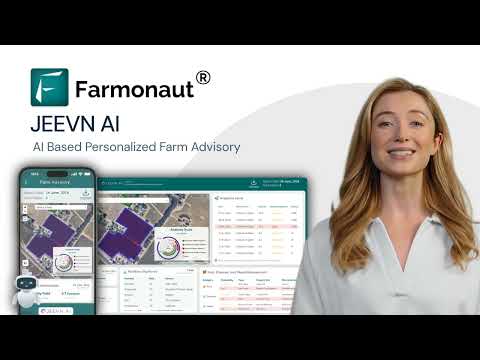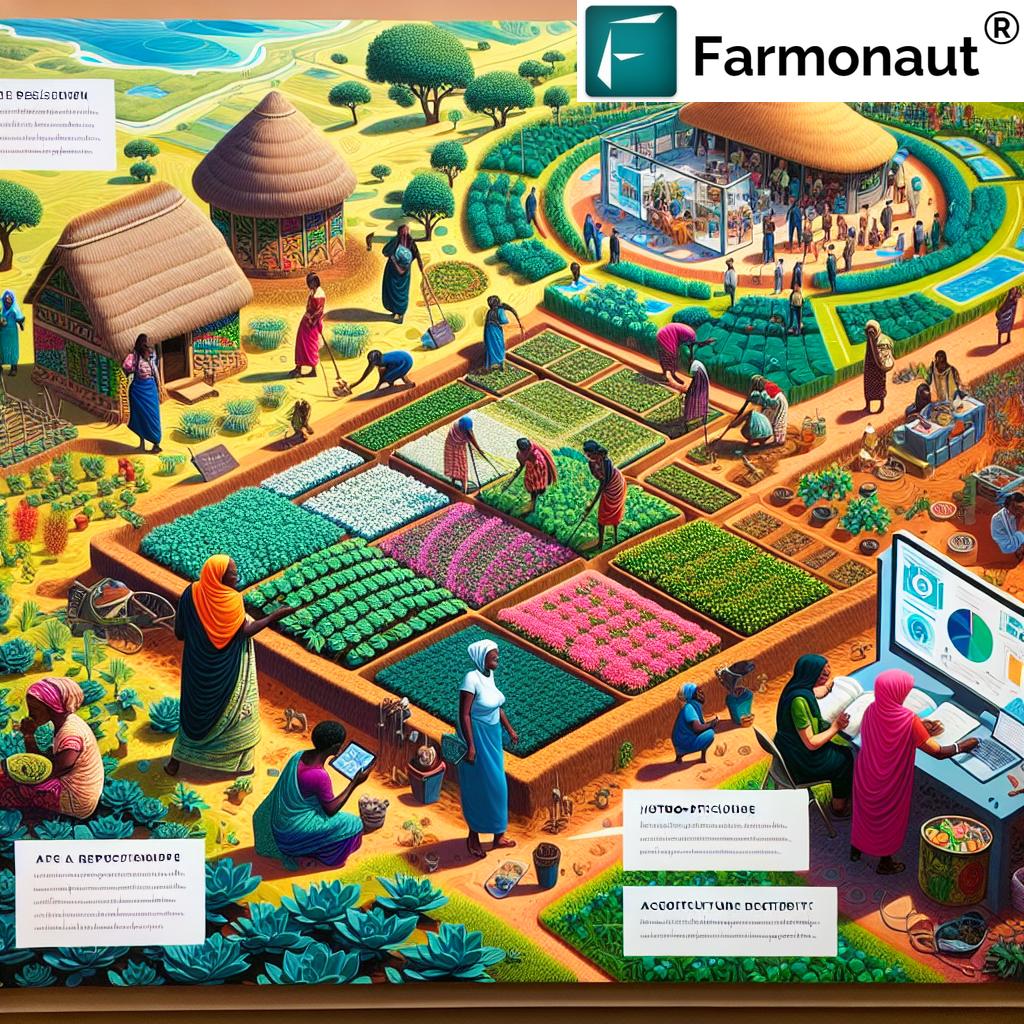Empowering Ethiopian Women Farmers: Digital Climate-Smart Advisory Services for Sustainable Agriculture
“Ethiopian women farmers contribute up to 70% of household food production despite limited access to resources.”
In the heart of Ethiopia’s agricultural landscape, a quiet revolution is taking place. Women farmers, long the unsung heroes of food production, are now at the forefront of a digital transformation that promises to reshape the future of sustainable agriculture. As we delve into this exciting realm, we’ll explore how innovative platforms like Farmonaut are bridging the gender gap in agro-climate information and empowering smallholder farmers with cutting-edge technologies.
The Critical Role of Women in Ethiopian Agriculture
Ethiopian women are the backbone of the country’s agricultural sector, contributing significantly to food security and economic growth. Despite their pivotal role, these hardworking farmers face numerous challenges, including:
- Limited access to resources and land ownership
- Lack of representation in agricultural decision-making processes
- Disproportionate effects of climate change on their livelihoods
- Insufficient access to agricultural extension services and modern farming techniques
These obstacles have long hindered the full potential of women in agriculture. However, the advent of digital agriculture advisory services is revolutionizing support for women farmers, addressing climate-smart farming practices and providing gender-responsive agricultural extension.
The Digital Revolution in Ethiopian Agriculture
The integration of technology into traditional farming practices is opening up new avenues for growth and sustainability. Platforms like Farmonaut are at the forefront of this revolution, offering advanced, satellite-based farm management solutions that are accessible via android, iOS, web/browser App, and API.
These digital tools are proving instrumental in:
- Providing real-time crop health monitoring
- Offering AI-based advisory systems for improved decision-making
- Implementing blockchain-based traceability for enhanced market access
- Facilitating resource management to optimize farm operations
For Ethiopian women farmers, these technologies are more than just tools; they’re pathways to empowerment and economic independence.
Climate-Smart Farming: A Necessity for Sustainable Agriculture
As climate change continues to pose significant threats to agricultural productivity, the adoption of climate-smart farming practices has become crucial. Digital advisory services are playing a pivotal role in promoting these practices among women farmers in Ethiopia.
Climate-smart farming practices encompass a range of techniques that aim to increase productivity while adapting to and mitigating the effects of climate change. These include:
- Drought-resistant crop varieties
- Water-conserving irrigation methods
- Soil conservation techniques
- Integrated pest management
By leveraging digital platforms, women farmers can access timely information on these practices, tailored to their specific local conditions and crop types.
Bridging the Gender Gap in Agro-Climate Information
One of the most significant barriers facing women farmers in Ethiopia has been the limited access to crucial agricultural information. Digital advisory services are changing this narrative by:
- Providing gender-responsive content that addresses the specific needs of women farmers
- Offering information in local languages to ensure wider accessibility
- Utilizing multiple channels of communication, including mobile apps and SMS services
- Incorporating traditional knowledge with modern scientific insights
Farmonaut’s platform, for instance, offers a user-friendly interface that allows women farmers to easily access and interpret critical agro-climate information, empowering them to make informed decisions about their crops and livestock.
“Digital agriculture advisory services have increased climate-smart farming adoption rates by 40% among Ethiopian women farmers.”
The Power of AI in Agricultural Advisory
Artificial Intelligence (AI) is revolutionizing the way agricultural advice is delivered to farmers. Farmonaut’s Jeevn AI Advisory System is a prime example of how AI can be harnessed to provide personalized farm management strategies.
This system analyzes various data points, including:
- Satellite imagery for crop health assessment
- Local weather patterns and forecasts
- Soil data and moisture levels
- Historical crop performance
By processing this information, the AI system can offer tailored recommendations for planting, irrigation, fertilization, and pest control, all of which are crucial for optimizing farm productivity.
Sustainable Agriculture Technologies for Smallholder Farmers
Sustainability is at the core of modern agricultural practices, especially for smallholder farmers who often bear the brunt of environmental changes. Digital advisory services are introducing sustainable agriculture technologies that are both effective and accessible to women farmers in Ethiopia.
These technologies include:
- Precision agriculture techniques for efficient resource use
- Smart irrigation systems that conserve water
- Organic farming methods that reduce chemical inputs
- Crop rotation and intercropping strategies for soil health
By adopting these technologies, women farmers can not only increase their yields but also contribute to the long-term health of their farmlands and the environment.
Inclusive Agricultural Development Strategies
To truly empower women farmers in Ethiopia, it’s essential to implement inclusive agricultural development strategies. These strategies should:
- Acknowledge and incorporate women’s traditional farming knowledge
- Provide gender-sensitive training and capacity building
- Ensure equal access to digital tools and technologies
- Promote women’s leadership in agricultural cooperatives and associations
Digital advisory services play a crucial role in facilitating these strategies by providing platforms for knowledge sharing, skill development, and community building among women farmers.
Addressing Water Shortages Through Digital Innovation
Water scarcity is a pressing issue for many Ethiopian farmers, particularly women who often have less access to irrigation infrastructure. Digital advisory services are helping to address this challenge by:
- Providing accurate weather forecasts for better water management
- Offering guidance on drought-resistant crop varieties
- Recommending water-efficient irrigation techniques
- Monitoring soil moisture levels through satellite imagery
Farmonaut’s satellite-based crop health monitoring system, for instance, allows farmers to track soil moisture levels and make informed decisions about when and how much to irrigate, leading to significant water savings.
Enhancing Market Access for Women Farmers
One of the key challenges facing women farmers in Ethiopia is limited access to markets. Digital advisory services are helping to bridge this gap by:
- Providing real-time market information and price trends
- Connecting farmers directly with buyers through digital platforms
- Offering guidance on post-harvest handling and value addition
- Facilitating access to financial services and credit
By leveraging these digital tools, women farmers can make more informed decisions about when to sell their produce and negotiate better prices, ultimately increasing their income and economic independence.
The Role of Traditional Knowledge in Digital Agriculture
While digital technologies are transforming agriculture, it’s crucial to recognize and integrate traditional farming knowledge. Many Ethiopian women farmers possess generations of agricultural wisdom that can complement modern scientific approaches.
Effective digital advisory services should:
- Incorporate local farming practices and indigenous knowledge
- Provide a platform for sharing traditional pest control and soil management techniques
- Validate and disseminate effective traditional methods through scientific analysis
- Encourage a two-way exchange of information between farmers and advisors
This approach ensures that digital solutions are culturally relevant and more likely to be adopted by women farmers.
Gender-Responsive Policies and Implementation Strategies
To fully realize the potential of digital advisory services for women farmers, it’s essential to have supportive policies and implementation strategies. These should focus on:
- Ensuring women’s equal access to digital technologies and training
- Promoting women’s leadership in agricultural decision-making bodies
- Addressing cultural barriers that may limit women’s participation in digital agriculture
- Providing incentives for the development of gender-responsive agricultural technologies
By creating an enabling environment, these policies can accelerate the adoption of digital advisory services among women farmers and contribute to more inclusive agricultural development.
The Impact of Digital Climate-Smart Advisory Services
To better understand the transformative power of digital climate-smart advisory services for Ethiopian women farmers, let’s examine their impact through a comparative table:
| Agricultural Challenges | Traditional Approach | Digital Advisory Services Solution | Estimated Impact on Productivity | Estimated Impact on Income |
|---|---|---|---|---|
| Water Shortages | Reliance on rain-fed agriculture | Smart irrigation recommendations based on satellite data | 30% increase in water use efficiency | 20% increase in crop yield |
| Climate Information Access | Limited access to weather forecasts | Real-time, localized weather data and predictions | 25% reduction in climate-related crop losses | 15% increase in income stability |
| Sustainable Farming Practices | Traditional methods with limited optimization | AI-driven recommendations for sustainable practices | 40% increase in soil health | 30% reduction in input costs |
| Market Access | Reliance on local markets and middlemen | Direct market linkages and price information | 20% increase in marketable surplus | 25% increase in selling price |
| Gender-specific Barriers | Limited access to agricultural extension services | Tailored, gender-responsive digital advisory | 35% increase in adoption of modern farming techniques | 40% increase in women’s agricultural income |
This table clearly illustrates the significant improvements that digital climate-smart advisory services can bring to women farmers in Ethiopia, addressing key challenges and boosting both productivity and income.
The Future of Digital Advisory Services in Ethiopian Agriculture
As we look to the future, the potential for digital advisory services to transform Ethiopian agriculture, particularly for women farmers, is immense. We anticipate:
- Increased integration of IoT devices for real-time farm monitoring
- Advanced predictive analytics for pest and disease management
- Expanded use of blockchain for transparent and fair market transactions
- Greater collaboration between digital platforms and traditional extension services
These advancements will further empower women farmers, enabling them to play an even more significant role in ensuring food security and driving economic growth in Ethiopia.
Frequently Asked Questions
- How do digital advisory services specifically benefit women farmers in Ethiopia?
Digital advisory services provide women farmers with access to crucial agricultural information, tailored advice, and market connections, helping them overcome traditional barriers and increase their productivity and income. - What are some examples of climate-smart farming practices promoted by digital platforms?
Examples include drought-resistant crop selection, water-efficient irrigation techniques, soil conservation methods, and integrated pest management strategies. - How does Farmonaut’s technology help address water shortages in Ethiopian agriculture?
Farmonaut uses satellite imagery to monitor soil moisture levels, providing farmers with precise irrigation recommendations to optimize water usage and improve crop yields. - What role does artificial intelligence play in agricultural advisory services?
AI analyzes various data points to provide personalized recommendations on planting, irrigation, fertilization, and pest control, helping farmers make informed decisions. - How can digital advisory services incorporate traditional farming knowledge?
By creating platforms for knowledge sharing, validating traditional methods through scientific analysis, and encouraging a two-way exchange of information between farmers and advisors.
Conclusion: A Digital Path to Empowerment
The integration of digital climate-smart advisory services in Ethiopian agriculture represents a powerful tool for empowering women farmers. By providing access to crucial information, personalized advice, and market opportunities, these services are helping to bridge the gender gap in agriculture and promote sustainable farming practices.
As we continue to develop and refine these digital solutions, it’s crucial to ensure they remain accessible, culturally relevant, and responsive to the unique needs of women farmers. With the right support and implementation strategies, digital advisory services can play a transformative role in creating a more inclusive, productive, and sustainable agricultural sector in Ethiopia.
The future of Ethiopian agriculture is digital, and women farmers are at the forefront of this exciting transformation. By embracing these innovative tools and technologies, they are not only improving their own livelihoods but also contributing to the food security and economic prosperity of their communities and the nation as a whole.
Ready to experience the power of digital agriculture? Explore Farmonaut’s innovative solutions:
For developers interested in integrating our powerful agricultural data into their own applications, check out our API and API Developer Docs.








